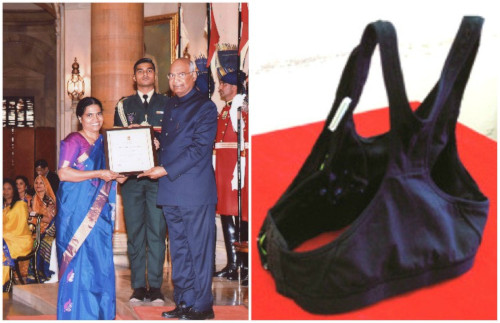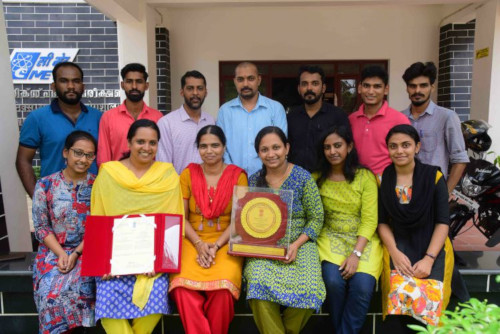Kerala Scientists Design A Low-Cost Bra To Detect Breast Cancer
Kerala Scientists Design A Low-Cost Bra To Detect Breast Cancer
www.mangaloretoday.com
Mar 16, 2019 - Due to lack of awareness and late detection, breast cancer is the most common cancer among women in India. As per statistics, it accounts for 27% of all cancers in women and approximately 2000 women are diagnosed with breast cancer daily.


While the disease was early found in women aged over 50, according to new surveys, women aged between 30 and 40 years old are developing breast cancer at an alarmingly increasing rate.
The usual course of diagnosis for breast cancer involves screening tests like mammogram that exposes one to radiations and is not really a viable option for everyone as it costs between Rs. 1,500 to Rs. 8,000. To overcome these limitations, a group of scientists from Kerala have come out with a product which would help in early diagnosis of the condition without any harmful effects on health and is cost-effective.
A team from Thrissur branch of Centre for Materials for Electronics Technology (C-MET), led by Dr. A Seema, who was recently awarded the prestigious Nari Shakti Puraskar by the President of India, has designed a wearable contraption with sensors embedded that detects cancerous cells in the breast.
Speaking to Better India, Dr. Seema shared how it all started. “The idea took root when the director of Malabar Cancer Centre (Kannur) visited us sometime in 2014. They’ve been our medical partners in this project. They broached the idea of working out ways of breast cancer detection on a community scale. Mammogram was the golden standard but the provision wasn’t available in even Primary Health Centres across the country. What they had in mind was a portable device that could be implemented at a community level. This propelled us to conceptualise a wearable device for detection through thermal imaging.”
It took the team four years to develop the device and get an approval through successful clinical trials conducted at Malabar Cancer Centre.
Talking about how the device works, Dr. Seema shared, “The sensors map the skin temperature of the breast and detects the presence of any form of abnormalities, which can then form the basis for patients to take further course of action. There is no exposure to radiation with this device as it physically maps the breast skin temperature. In addition to that, the device is portable which makes it perfect for any health care or ASHA worker to carry with them during field visits. It can be easily contained in a small briefcase.”
Due to lack of awareness and late detection, breast cancer is the most common cancer among women in India. As per statistics, it accounts for 27% of all cancers in women and approximately 2000 women are diagnosed with breast cancer daily.
While the disease was early found in women aged over 50, according to new surveys, women aged between 30 and 40 years old are developing breast cancer at an alarmingly increasing rate.
The usual course of diagnosis for breast cancer involves screening tests like mammogram that exposes one to radiations and is not really a viable option for everyone as it costs between Rs. 1,500 to Rs. 8,000. To overcome these limitations, a group of scientists from Kerala have come out with a product which would help in early diagnosis of the condition without any harmful effects on health and is cost-effective.
A team from Thrissur branch of Centre for Materials for Electronics Technology (C-MET), led by Dr. A Seema, who was recently awarded the prestigious Nari Shakti Puraskar by the President of India, has designed a wearable contraption with sensors embedded that detects cancerous cells in the breast.
Breast Cancer
Dr A Seema (sitting, third from left) and team members after receiving NAWD award. Courtesy: C-MET.
Speaking to Better India, Dr. Seema shared how it all started. “The idea took root when the director of Malabar Cancer Centre (Kannur) visited us sometime in 2014. They’ve been our medical partners in this project. They broached the idea of working out ways of breast cancer detection on a community scale. Mammogram was the golden standard but the provision wasn’t available in even Primary Health Centres across the country. What they had in mind was a portable device that could be implemented at a community level. This propelled us to conceptualise a wearable device for detection through thermal imaging.”
It took the team four years to develop the device and get an approval through successful clinical trials conducted at Malabar Cancer Centre.
Talking about how the device works, Dr. Seema shared, “The sensors map the skin temperature of the breast and detects the presence of any form of abnormalities, which can then form the basis for patients to take further course of action. There is no exposure to radiation with this device as it physically maps the breast skin temperature. In addition to that, the device is portable which makes it perfect for any health care or ASHA worker to carry with them during field visits. It can be easily contained in a small briefcase.”
“Most importantly, this device ensures the privacy of the wearer because one can wear clothes over it during the test. This is really significant as most women deter from taking the mammogram or any form of clinical screening because of their cultural conditioning and privacy issues.”
While mammograms can only be undertaken by women above the age of 40, this device overcomes the shortcoming as it is designed in a way where girls as young as 15 or 20 can also wear it.
Coming to the cost aspect of using this device, Dr. Seema shared, “The wearable device alone would cost between Rs 400-500 and these are our lab estimates. Once commercialised, it could even get cheaper. If one is to go through the tests alone, I can ascertain that it wouldn’t cost more than Rs 50.”
To ascertain the success of the device, a total of 117 patients and 200 volunteers were part of the C-MET team’s clinical trials. The team is now working to collaborate with a company to make the technology commercial. “At present, they are in the training process and as soon as their production begins, another set of clinical trials will be undertaken from their end. As these trials often take some time, we are estimating that the device will be in the market in a year or so.”
The team of scientists includes Muralidharan, Arathi K, Renjith, Deepak, Haseena, Eva Ignatius, and Sreelakshmi as the core project team. And Sunny and Sridhar Krishna are the technical staff.
courtesy - IndianWomenBlog
- Karnataka government focusing on harnessing more solar power, says Energy Minister
- Pedestrian fatally run over by tanker at Kulur
- Karkala: Forest fire engulfs vast tracts of land
- Maintenance works in Palakkad division; changes in train services
- Udupi: Bike-tipper collision claims rider’s life
- Kadaba acid attack victim writes CET in Mangaluru
- EC dismisses concerns as Kasaragod mock poll sparks row
- Malpe: 3 tourists washed away by strong tidal waves; 2 rescued; 1 drowns
- IMD predicts rain, thunderstorms across Karnataka for next 3 days
- WhatsApp will soon let you see which of your friends were recently online
- Kasaragod: SC asks EC to check reports of EVMs registering ‘extra votes’ for BJP in mock polls
- Elect a representative who works for you, Hegde tells voters
- St Joachim church Kadaba, commemorated its Centenary celebration on April 17
- World Liver Day 2024: These factors might worsen your liver health
- World Heritage Day 2024: Theme, history, significance, and top 5 heritage sites in India
- How science will get Sun to kiss Ram Lalla’s forehead on Ram Navami
- Artist’s sweet gesture towards waiter impresses the Internet, Watch
- Children addicted to video games, smartphones at risk of Psychosis: Study
- This story of an ailing elephant and her calf will move you to tears
- Listen to your body: 5 types of pain signalling heart issues
- Eid ul-Fitr: Why it is celebrated and other things to know
- 10 Health benefits of avoiding Sugar completely
- Ugadi 2024: A look at the importance of this festival in Karnataka
- Total Solar eclipse 2024: Do’s and don’ts to follow during the eclipse
- Common household chemicals could harm brain development, study suggests
- Frightening video of Strawberry under Microscope shocks Internet, Watch
- "Are we in Pak or Afghanistan?" Actor, husband attacked by mob in Bengaluru
- Air India suspends flights to Tel Aviv till April 30 amid Iran-Israel clash
- H5N1 strain of bird flu found in raw milk from infected animals: WHO
- Not love jihad: Karnataka govt amid outrage over woman’s murder in college
- Indian embassy advises Indians to reschedule non-essential travel as UAE reels under historic floods
- Almost 0% voting in 6 Nagaland districts over separate territory demand
- Amit Shah files nomination from Gandhinagar: ’Rose from booth worker to MP’
- Supreme Court’s big order on voter awareness rallies amid prohibitory orders
- Elon Musk’s message of peace amid Israel-Iran tensions: ’Send rockets to stars’
- Rajinikanth, Kamal Haasan, Dhanush, Vijay Sethupathi vote in Chennai
- Vice Admiral Dinesh Tripathi appointed as next Indian Navy chief
- Iran shoots down several drones, US officials suspect Israel: 10 points
- CITY INFORMATION
- TRAVEL
- TOURIST INFORMATION
- HEALTH CARE
- MISCELLANEOUS




 Write Comment
Write Comment E-Mail
E-Mail Facebook
Facebook Twitter
Twitter  Print
Print 

